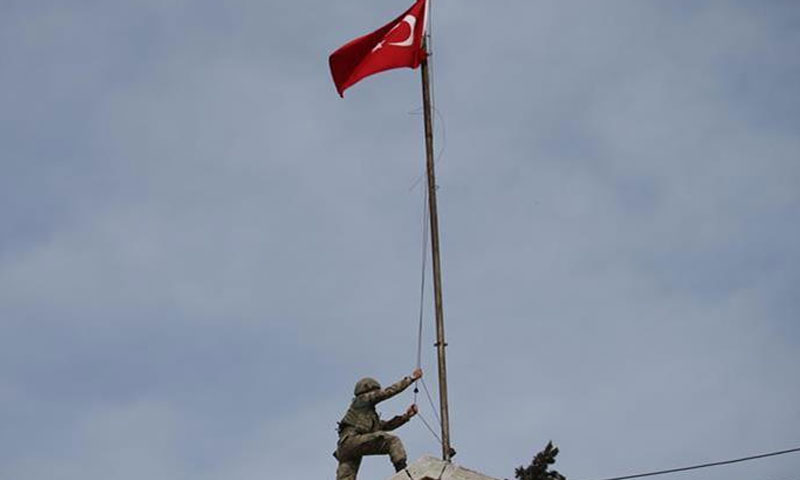Turkey has completed preparations for a military operation against the Syrian regime forces, which continue taking over areas in the provinces of Aleppo and Idlib.
The Turkish President Recep Tayyip Erdogan gave the Syrian regime until the end of February to withdraw behind the boundaries set by the “Sochi” agreement in an effort to de-escalate the situation in Idlib, Syria’s last opposition stronghold.
Turkey currently faces a Russian denial of threats issued by Ankara against the Syrian regime forces. Russia, the main ally of the Syrian regime, believes that Ankara is responsible for the violation of the “Sochi” agreement, signed by Erdogan and Russian President Vladimir Putin, on 17 September 2018.
Turkey’s intention to launch a military operation in Syria has always been met with declared or undeclared refusal by the actors in Syria.
The US supports while Russia opposes the Operation Euphrates Shield
Turkey conducted a military operation titled “Operation Euphrates Shield” on 4 August 2o16, aimed at expelling the so-called Islamic State from its border region. The operation first targeted the city of Jarablus, lying on the western bank of the Euphrates, in the northern countryside of Aleppo.
The offensive was also carried out to prevent the Kurdish People’s Protection Units YPG, the backbone of the Syrian Democratic Forces (SDF), from capturing and annexing Jarabulus to the city of Manbij (36 kilometers, south of Jarablus); the SDF captured Manbij from ISIS’s hands,” on 12 August 2016.
The Operation Euphrates Shield ended on 29 March 2017, after the Turkish Armed Forces (TAF) and the Syrian National Army (SNA) managed to establish control over districts of Jarabulus, al-Rai, Dabiq, Azaz, Marea, and al-Bab, which was a stronghold of the ISIS in the region.
During “Operation Euphrates Shield,” a Russian refusal emerged, based on the position of its ally, the Syrian regime.
The Ministry of Foreign Affairs of the Russian Federation expressed its “deep concerns” over the incursion of the TAF and the Turkish-backed Syrian armed opposition factions into Syrian territory.
The ministry pointed out that these military operations were taking place without coordinating with the “legitimate Syrian authorities,” and without the authorization of the United Nations Security Council.
For its part, the Syrian Ministry of Foreign Affairs condemned the “Operation Euphrates Shield,” and considered it “a flagrant violation of its sovereignty.”
In a statement by the Syrian Foreign Ministry said at that time, “Damascus insists that combating terrorism on the Syrian soil from any party must be carried out through coordination with the Syrian government and the Syrian army.”
On the other hand, the US and the German governments supported the launch of the Turkish offensive in Syria. Besides, the US Vice President Joe Biden expressed Washington’s support for their full ally Turkey.
NATO refuses the Operation Olive Branch
Turkey faced criticism about the conduct of its military operation in northern Syria codded “Operation Olive Branch” from its Nato partner states, especially the US.
The TAF and the SNA initiated “Operation Olive Branch” in the Syrian area of Afrin, dubbed “the Olive Branch,” aimed to remove the YPG from the area on 20 January 2018.
They also managed to control the city of Afrin and its environs, such as Sheeran Raju, Generis, and other villages and towns.
Britain, France, Germany, the US, and the Netherlands called on Ankara to show restraint. At the same time, the European Union foreign policy chief, Federica Mogherini, said civilians should be spared the damages of the military operation in the Afrin area.
For its part, the Syrian regime and its ally Russia remained adhered to the principle of the Syrian state’s sovereignty, demanding the need for coordination with it in case any party wanted to enter Syria.
US-Russian understanding, but European refusal to Turkey’s Operation Peace Spring
Erdogan announced the launch of Turkey’s Operation Peace Spring in cooperation with the SNA on 9 October 2019.
The operation launched to clear northern Syria bordering Turkey’s southeast from YPG; the TRF and the SNA were able to gain control over the cities of Tell Abyad in rural Raqqa, and Ras al-Ain in rural al-Hasakah in addition to the areas between them.
Both Russia and the US agreed that Turkey has its right of self-defense in the face of threats against its national security through carrying out Operation Peace Spring and ending the dream of the Kurdish YPG to establish an autonomous Kurdish entity on its border, according to official Turkish statements.
Nevertheless, the European countries criticized the Operation Peace Spring and escalated their war of words against Ankara.
Many European countries, one by one, suspended/banned weapons sales/exports to Turkey.
The US President, Donald Trump, was rebuked for his decision to withdraw US forces, which critics believed gave Turkey the green light to launch its military operation and enter the east of the Euphrates River.
On 9 November 2019, Trump said, “they are only defending their lands,” in reference to YPG units.
Trump added, “we have spent tremendous amounts of money on helping the Kurds – in terms of ammunition, in terms of weapons, in terms of money, in terms of pay. Sine we said so, we liked the Kurds… [… ]. When you say, they’re fighting with the US, yes. But they’re fighting for their land.”











